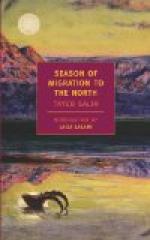June 6th at a quarter of seven saw the whole populace of Athabasca Landing on the river bank—dogs, babies, the officials of the Hudson’s Bay, parson, priest, police, and even the barkeep,—and with the yelping of dogs and “Farewell, Nistow!” we are off. We are embarked on a 2500-mile journey, the longest water route on the continent, down which floats each year the food, clothing, and frugal supplies of a country as big as Europe.
The river is running five miles an hour and there is no need of the oars. The steersman is our admiration, as with that clumsy stern-sweep he dodges rocks, runs riffles, and makes bends. The scow is made of green wood, and its resilience stands it in good stead as, like a snake, it writhes through tight channels or over ugly bits of water. Everybody is in good humour; we are dreamers dreaming greatly. Why should we not be happy? Mrs. Harding is homeward-bound, Mr. Brabant on a new rung of the fur ladder of preferment, Inspector Pelletier and his associates starting on a quest of their own seeking. Sitting low among the “pieces” of the police boat, with only his head visible in the sunset glow, Dr. Sussex builds air-castles of that eleemosynary hospital of his on the Arctic Circle. The cook is whistling from the cook-boat. Five years ago he graduated from a business college, but the preparation of bannock and sow-belly appeals to the blood more insistently than trial balances and the petty cash book. As for ourselves, the Kid’s smile is almost audible as she runs a loving hand over the oilskin cover of the camera. A favourite expression of mine in the latitudes below when the world smiled was, “Oh, I’m glad I’m alive and white!” On this exclamation I start now, but stop at the word “white.” North of Athabasca Landing white gives place to a tint more tawny.
A hundred yards out, the Policemen are boyish enough to launch those shiny Peterboroughs just to try them, and in and out among the big sturgeon-heads, debonair dolphins, they dart. Then comes the rain, and one by one the clumsy boats turn toward shore. There are some things that even the enquiring mind cannot run to ground, things that just happen out of the blue. For fifteen successive springs I have tried to discover the first boy who brought marbles to school when marble-season came in, and I have never yet been able to put my finger on that elusive history-maker. So on this voyage, the fleet is started and stopped, landings are made, camping-places decided upon, and no ear can detect the sound of command.
The scows tie up, and without undressing we sleep on board, pulling a tarpaulin over us and letting the rain rain. At 5:30 next morning we hear the familiar “Nistow! Nistow!” of the awakened camp. This word literally means “brother-in-law,” but it is the vocative used by the Cree in speaking to anybody he feels kindly toward. The cook makes a double entry with bacon and bannock, and there is exulting joy in our soul. Who would napkins bear, or finger-bowls? We had put them far behind, with the fardels.




